Shweta Harve’s ‘Have You Loved Like a Tree?’ Finds Quiet Strength in the Language of Enduring Love

In “Have You Loved Like a Tree?,” singer-songwriter Shweta Harve approaches love not as spectacle but as structure — something living, layered, and sustained over time. Released on Valentine’s Day 2026, the song sidesteps the holiday’s customary exuberance, offering instead a contemplative meditation on emotional constancy. Through spare arrangement and carefully paced lyricism, Harve constructs a song that values patience over immediacy and resilience over sentimentality.
The track revolves around a single, extended metaphor: love as a tree. It is a familiar symbol, but Harve treats it with deliberate care, using it not merely as decoration but as an organizing principle for the song’s emotional progression. In the opening verse, she establishes the metaphor with lines that position stability and quiet presence as acts of devotion: “Standing tall through the years / Extending branches to catch your tears.” The imagery emphasizes durability, suggesting that love can exist without fanfare, defined instead by its willingness to remain.
Musically, the song reinforces that steadiness. The arrangement, composed by Dario Cei, is restrained and atmospheric, relying on gentle melodic development rather than dramatic shifts. The instrumentation creates a sense of open space around Harve’s voice, allowing the lyrics to remain central. The production, engineered by Serhii Cohen, maintains clarity and warmth, avoiding the layered density common in contemporary pop ballads. The result is a soundscape that feels unhurried, encouraging attentive listening.
Harve’s vocal performance matches the song’s thematic focus. She sings with composure and subtle dynamic control, resisting ornamentation in favor of direct emotional communication. Her phrasing is deliberate, giving weight to lines such as the chorus declaration, “Just like a tree, I will never fold / I will only give, endure, and grow.” The sentiment is expressed without theatrical flourish, allowing the words themselves to carry resonance.
The song’s narrative arc traces the life cycle of many relationships, moving from closeness to distance and, ultimately, to reflection. In the bridge, Harve introduces an especially poignant idea: “And even when your heart is gone / My shade will stay all along.” Here, love is framed as presence rather than possession, an interpretation that gives the song its philosophical depth.
Beyond the recording itself, “Have You Loved Like a Tree?” extends its message through a related tree-planting awareness initiative, encouraging listeners to mark relationships through acts of environmental stewardship. While such campaigns can risk feeling peripheral, the concept aligns naturally with the song’s emphasis on longevity and care.
Harve has built a reputation for introspective songwriting, and this release continues that trajectory. “Have You Loved Like a Tree?” stands out not for grand declarations, but for its commitment to emotional endurance. In a musical landscape often driven by immediacy, the song proposes an alternative measure of love — one defined by its ability to remain rooted, even as circumstances change.
–John Parker
James Laurent Turns Personal Chaos into ‘Laugh at the Tragedy’
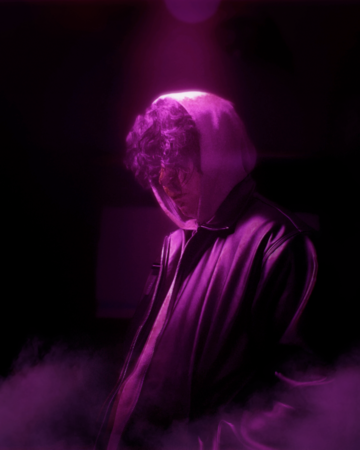
Milwaukee-born, Ecuadorian-American artist James Laurent delivers his most personal work yet with ‘Laugh at the Tragedy’, an emotionally raw, 8-track indie-electric rock album shaped by heartbreak, burnout, and irony.
A former soccer hopeful, Laurent pivoted to music after a career-ending injury at 17, teaching himself production and engineering on a family laptop and borrowed microphone. By 20, he was a sought-after engineer in Los Angeles, contributing to major studios and television productions, and designing Dolby Atmos-certified mixing rooms, including at Amazon Music.
‘Laugh at the Tragedy’ was written and recorded in six intense days, emerging from a period of personal collapse: a long-term relationship ending, financial pressure, and struggles with addiction. The result is a stripped-back, unpolished record that leans into vulnerability and discomfort rather than resolution, offering a raw snapshot of exhaustion and self-awareness.
Despite the darkness that shaped it, Laurent’s resilience shines through. Already RIAA Gold-certified and achieving his first Netflix sync independently, he continues to carve out a singular path in music. Laugh at the Tragedy stands as a testament to survival, honesty, and the stubborn humour that carries him forward.
Single Review: Gary Pratt “Buzzin’” (March 13th release date)

Gary Pratt’s “Buzzin’” doesn’t stroll in politely, hat in hand, asking to join the country party — it kicks the door off the hinges, drags in a cooler full of ice-cold beer, and rewires the jukebox so it only plays songs about the beautiful, brain-fuzzing joy of being alive when the night is young and the possibilities are infinite. If country music still has a pulse somewhere between the neon bar glow and the hum of power lines stretching across a summer sky, Pratt just hooked jumper cables to it and yelled, “Stand back!”
From the opening tumble of imagery — neon, honey bees, airplanes slicing through treetops — the song operates like a half-remembered fever dream of small-town Americana, stitched together with the kind of casual poetry that country music sometimes forgets it invented. These aren’t just random snapshots. They’re sonic Polaroids, flickering past your brain like you’re leaning out the passenger window at 70 miles per hour, wind smacking your face while someone cranks the stereo just past the point of distortion and common sense.
Then comes the chorus, and Pratt locks into something primal and gloriously uncomplicated. “Then there’s me and you sippin’ on ice down cold brews…” It’s the kind of line that doesn’t ask for philosophical unpacking. It’s the whole thesis statement of youthful rebellion disguised as adult relaxation. The repetition of “buzzin’” isn’t lazy songwriting — it’s hypnotic, mantra-like, the sound of a good time looping in your brain long after last call. You don’t listen to it. You get absorbed by it, like walking into a bar where every stranger suddenly feels like someone you’ve known since third grade detention.
What makes “Buzzin’” hit harder than your average feel-good country rocker is Pratt’s delivery. He doesn’t sing like he’s trying to convince you he’s having fun. He sounds like he’s already three songs deep into the best night of his life and forgot you were tagging along. There’s a lived-in looseness to his vocal phrasing, a blue-collar swagger that feels earned rather than manufactured.
The verses stack up everyday Americana with almost punk-rock defiance — alarm clocks, lawnmowers, grandpa snoring, mud tires screaming over blacktop. It’s mundane turned mythological. Pratt turns ordinary life into a carnival ride, proving once again that country music works best when it celebrates the details most people ignore.
Co-written by hitmaker Jon Pardi, Kenneth Johnson, and Bart Butler, the track carries a commercial polish without sanding down its personality. The production gleams, but it never suffocates the song’s rowdy heartbeat. It struts instead of preens.
“Buzzin’” is less about alcohol or parties and more about momentum — that electric, fleeting moment when life lines up just right and you know the night’s about to detonate into memory. It’s reckless, nostalgic, loud, and blissfully unconcerned with subtlety.
And honestly? Subtlety was never invited to this party anyway.
–Leslie Banks
Former BOSTON Guitarist/Vocalist David Victor Invites Hosts to Turn Their Next Event in to a Rockin’ Benefit Concert
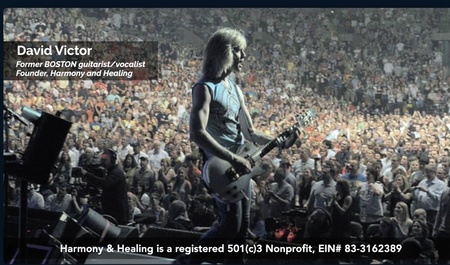
Initiative Supports Harmony & Healing, a 501(c)(3) Nonprofit Bringing Live Music to Hospice, Hospital, Rehab, and Memory Care Patients
Looking for an event your friends, family, or co-workers will talk about long after the last encore? David Victor, former guitarist and vocalist for the multi-platinum rock band BOSTON, is unveiling his latest initiative to support his nonprofit Harmony & Healing – private benefit concerts. These intimate, high-energy live music experiences will transform backyards and event spaces into must-see venues, all while supporting his 501(c)(3) nonprofit which brings live music to hospice, hospital, rehab, and memory care patients.
At the heart of the experience is Tha Therapy Dawgs, a powerhouse trio led by Victor, joined by drummer Michael Brandon and bassist Russell Vazquez. The band delivers multiple sets of crowd-pleasing hits ranging from BOSTON and Journey to Bruno Mars, Maroon 5, Train, and Pink, guaranteeing a dance-filled night for every generation.
“People are craving events that bring them together. And music does that like nothing else,” said Victor. “These concerts don’t just create incredible memories for guests; they directly fund live musical visits for patients who truly need joy, comfort, and connection.”
What Is a Harmony & Healing Private Benefit Concert?
Hosts provide the space—anything from a backyard to a private venue—while Harmony & Healing handles the rest. Each event includes professional concert-level sound and production, multiple live music sets, and a brief, fun live auction featuring items such as autographed acoustic guitars, the chance to sing with the band, wine packages, golf rounds, and more. Many hosts personalize their events with vacation stays, private wine tastings, or VIP sports and concert tickets.
Best of all, the model is simple and stress-free:
· Guests make donations to Harmony & Healing
· Donations cover food, production, and entertainment
· Hosts earn “host with the most” status, without footing the bill
What Hosts and Guests Get
· A private concert experience that rivals ticketed shows
· High-energy, danceable music spanning classic rock to modern pop
· A lively auction and raffles supporting a meaningful cause
· Complete event support, including setup and breakdown
· Zero stress, just great music, great people, and a great purpose
Every private benefit concert directly supports Harmony & Healing’s mission to bring live musical moments to patients in hospice, hospitals, rehabilitation centers, and memory care communities. And they empower hosts to turn life’s celebrations—from personal milestones to corporate gatherings—into events that deliver lasting, positive change.
To view a video about how to host a Harmony & Healing private benefit concert, visit https://iframe.mediadelivery.net/play/583458/3dcc509f-1980-4fee-9a40-014e1232ab62.
To learn more about Harmony & Healing private benefit concerts, visit https://www.harmonyandhealing.org/host-a-private-benefit-concert/.
# # #
About Harmony & Healing
Harmony & Healing is a 501(c)(3) nonprofit organization dedicated to delivering live musical visits to individuals in hospice, hospital, rehab, and memory care settings. Through the power of music, Harmony & Healing brings comfort, joy, and connection to patients and their families when they need it most.
EIN: 83-3162389
MICHAEL GILAS ANNOUNCES NEW SINGLE “SIGMUND FREUD GIRLFRIENDS” ALONG WITH A SHOW AT NYC’S THE CUTTING ROOM ON APRIL 8TH

MICHAEL GILAS ANNOUNCES NEW SINGLE “SIGMUND FREUD GIRLFRIENDS” ALONG WITH A SHOW AT NYC’S THE CUTTING ROOM ON APRIL 8TH
San Diego, CA – February 2026 – Rising Adult Contemporary Michael Gilas is set to release his bold new single, “Sigmund Freud Girlfriends.” The track brings a sharp, clever take on today’s social – media “experts,” inspired by a simple moment: “Saw all these people on a YouTube video, beta waves listening and now they’re experts.”
Written by Michael Gilas, Bill DILuigi, and Allan Phillips, the song blends wit, truth, and Michael’s signature melodic edge. It’s a fresh, modern commentary wrapped in the undeniable hooks and polished production Gilas is known for.
The single is produced by an elite creative team: Grammy-winning producer Brian Kennedy, along with Michael Gilas, Allan Phillips, and Stephen Wrench, a powerhouse collaboration that elevates the song’s unique concept and radio – ready sound. With multiple Billboard charting singles already under his belt, Michael continues to push boundaries with music that connects emotionally, challenges the norm, and showcases his artistry.
“Sigmund Freud Girlfriends” arrives with momentum and unmistakable personality, a sharp, intelligent track from an artist proving he has plenty more to say.
For tickets to see Michael Gilas at The Cutting Room in NYC on April 8, follow the website at https://thecuttingroomnyc.com/calendar/ for the announcement
More About Michael Gilas:
A gifted songwriter and storyteller, Michael overcame a severe riding injury to discover that his true gift was music. Today, he inspires people around the world with his message of hope and resilience. His track “Working With the Rain” charted at #13 on the Billboard charts; as well as “Can’t Hide Beautiful,” charting at #21 on the Hot AC Charts.
Interview: Rising Czech Republic Star THERA Opens Up On ‘Milestone’ Arena Tour

You’ve had a rapid rise over the past year, from touring with Loreen to now stepping onto arenas with Jason Derulo. How have these back‑to‑back milestones shaped your confidence and perspective as a young artist navigating such a fast‑moving career?
I believe that all of the milestones I’ve achieved over the past year have really shaped my confidence and who I want to be as an artist. Seeing the fans at these live shows has not only shown me the power of my music, but also what elements I want to add more of into the shows. Every new milestone keeps on building my artistry and the upcoming era of THERA.
This tour marks your biggest live moment yet. When you think about performing for thousands every night, what aspects of your artistry are you most excited to showcase on a stage of this scale?
I’m really excited to show the fans how much I have grown vocally, and this new dance/ choreo aspect of the show. I’ve worked hard on making sure I am ready for these big shows, and I have honestly never had so much fun on stage.
You’re opening the year with a dark techno remix of ‘rewind’. What inspired you to explore a more electronic direction, and how does this remix reflect where you see your sound evolving?
I always love hearing different versions or alternative sounds to the songs that I make. When KNWLSY sent over his idea of the remix, I instantly fell in love with it. Originally, I wasn’t planning on such a sound, but I feel like it fits the song’s message so well. I would say this song reflects my transition into the dance world, and wanting to work with more choreography in the future.
The original ‘rewind’ captures the emotional loop of toxic love. How do you approach transforming such personal experiences into music that feels both vulnerable and empowering?
I think it comes naturally from me writing the music as a therapeutic tool for myself. The vulnerability comes from the lyrics and emotions that I feel are right, and then I just polish it with the music.
Which artists are you currently enjoying, and what would be your dream collaboration?
I have always been inspired by Madison Beer. She is one of the artists who got me into songwriting, as I fell in love with Dear Society when it came out. I would say that would be my dream collaboratio,n too. Writing a song with her would be such a special experience for me, so maybe one day.
Your name, THERA, comes from the idea of music as therapy. How has your relationship with songwriting changed now that your music is reaching a global audience who may be using it as their own form of healing?
I wouldn’t say it has changed, and that’s what I love about it so much. Of course, it’s a bit different in the sense that I am writing for a bigger audience. However, my songwriting still comes from my personal experiences, and the songs are created as a therapeutic outlet for me. I share the songs in the hope that if someone needs to hear a specific message or to know that they’re not alone in what they may be going through, my songs are there for them.
You released your debut album ‘I Wish I Called’ last year. Looking back, what did creating that project reveal about the kind of stories you want to tell as an artist?
I wrote IWIC truly only for myself. That album, originally, was never going to be released. It served almost as my diary of things I needed to get out of my head and leave behind. And it really did that for me. I feel like that album set up my whole message behind my music, and my goal of creating a safe space for my fans.
If you could summarise your next musical era in one word, what would it be?
I would say “bold” is the word for this next era.
Between Songs: The Final Day of Vince Guaraldi
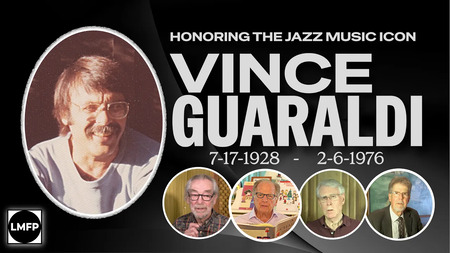
On February 6, 1976, the world didn’t yet realize it was about to lose a voice that had gently scored childhood itself. Vince Guaraldi was only 47 years old, still in motion, still playing, still doing what he loved most—sitting at the piano and letting his heart spill out in melodies that felt like snowfall and laughter and longing all at once.
That day unfolded like so many others in his life: unpretentious, musical, human. Vince was in Menlo Park, California, booked for performances at Butterfield’s, a familiar room from steady, regular gigs, filled with clinking glasses and quiet conversations, the kind of place where jazz breathes easily. Between sets, he stepped away from the piano—just a pause, a breath—never imagining it would be his last.
He collapsed suddenly. There was no grand exit, no dramatic farewell. Just a life that stopped between songs.
And yet—how fitting, in a way, for a man whose genius lived in the spaces between notes.
Vince Guaraldi never chased spectacle. He wrote music that listened to people. His touch at the piano carried warmth, mischief, tenderness, and an unmistakable sense of wonder. He gave us melodies that felt like autumn afternoons, like first snow, like quiet hope. Through his music—especially the timeless themes he created for Peanuts—he became part of family living rooms, holiday traditions, and the emotional vocabulary of generations. He taught us that jazz could be gentle. That complexity could be kind. That a simple piano line could say everything.
Those who knew Vince remember him not only as a gifted musician, but as a deeply feeling soul—humble, funny, searching. He was a man who showed up, played honestly, and trusted the music to do the talking. On his final day, he did exactly that. He played. He rested. And then, softly, he was gone.
But Vince Guaraldi did not leave us in silence.
He left us with soundtracks to our lives—music that still plays when a child first discovers wonder, when snow falls outside a window, when nostalgia sneaks up and wraps us in its arms. He left us warmth.
This video is offered in his honor.
It tells the story of his final hours with compassion, through the voices of those who knew him best. It remembers not just how he died, but how he lived—between performances, between heartbeats, always in service of the song.
https://youtu.be/XauQUU8m58o?si=wlyQoGVLlD5wLnKP
Today, on the 50th anniversary of his passing, we don’t just mourn Vince Guaraldi.
We listen to him.
We feel him.
And we remember him for all the grace and happiness he has left behind.
Built to Last: Karson City Rebels Find Power in Forever
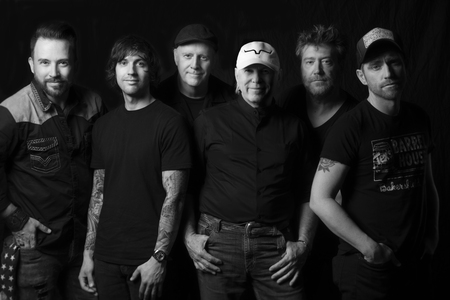
With “Our Love Lives Forever,” Karson City Rebels tap into something increasingly rare in modern roots rock: sincerity without sentimentality. The new single finds frontman Gil Karson at his most restrained and effective, letting a lived-in story and a patient groove do the heavy lifting rather than chasing bombast.
Built on steady, heartland-ready guitars and a rhythm section that never rushes the moment, the song feels like it was meant to be played with the windows down somewhere between New Mexico dust and Texas asphalt. Karson’s vocal carries the weight of experience, not nostalgia for its own sake, but the kind that comes from having actually watched love last.
What makes the song resonate is its lyrical economy. Lines like “I fell in love with you early, I was just learnin’ to drive” immediately place the listener inside a shared past, grounding the song in memory rather than abstraction. The repeated exchange of “ever-lovin’ man” and “my only woman” functions almost like a vow, deliberately circular, reinforcing the song’s core idea that enduring love is built on repetition and choice. Even the chorus avoids excess, stating its thesis plainly: “The love we live, we’re in it together / Our love lives forever.” In a genre often tempted by poetic overreach, the restraint feels earned and honest.
There is a classic-country spine running through the track, with echoes of Bakersfield grit and Southern rock muscle, but the production keeps it clean and timeless. The mix by Grammy winner Gerhard Joost gives the guitars room to breathe, while the Nashville mastering ensures the song hits with warmth rather than polish. Nothing feels overworked, which mirrors the song’s message that longevity is about steadiness, not flash.
Karson City Rebels have made their name on high-energy Americana rock, but “Our Love Lives Forever” reveals the band’s emotional range. It is a slow-burn anthem for commitment, the kind of song that sneaks up on you and lingers long after the final chorus fades. Released just ahead of Valentine’s Day, it sidesteps clichés and offers something sturdier: a reminder that the most radical love story is the one that survives.
For a band rooted in tradition but still chasing relevance, this is Karson City Rebels at their most confident and human. “Our Love Lives Forever” does not just celebrate forever. It sounds like it understands what it takes to get there.
SOCIAL LINKS:
https://x.com/karsoncityrebel
https://www.facebook.com/karsoncityrebelsband/
https://www.instagram.com/karsoncityrebels/?hl=en
Billy Ray Rock Throws the Ultimate After-Hours Revolution with ‘4 Fingers Get Up’
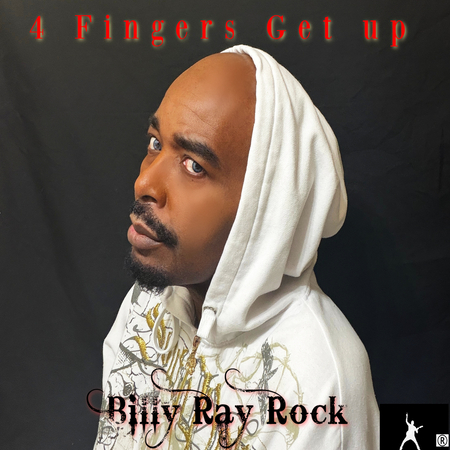
There’s a certain electricity that lives in the DNA of great party anthems — the kind that doesn’t just play through speakers but crawls under your skin, grabs your pulse, and dares you to keep up. With “4 Fingers Get Up,” Billy Ray Rock doesn’t just flirt with that energy… he detonates it. The self-proclaimed King of Funk Rock storms in with a swagger-heavy, neon-lit track that feels like it was engineered somewhere between a sold-out arena, a smoky nightclub, and a reckless 3 a.m. afterparty you’ll never fully remember but won’t forget either.
Billy Ray Rock has always operated like a musical hybrid machine — part funk revivalist, part rock showman, part club-culture architect. On “4 Fingers Get Up,” he leans into all three lanes with unapologetic confidence. The groove hits first, thick and sticky like vintage Cameo colliding with modern club bass. Then comes the vocal delivery, dripping with charisma and urgency, riding the beat with the loose-but-locked control of someone who understands how to command a room long before the crowd even realizes they’ve surrendered.
https://www.youtube.com/watch?v=2RbBJnjJWN4
The chorus is the undeniable knockout punch. It’s chant-ready, wrist-flicking, crowd-hypnotizing gold. The kind of hook that feels engineered for packed floors and raised glasses, but never comes across as manufactured. There’s a rawness here — a looseness — that feels authentic to Billy Ray Rock’s live-wire personality. You can practically see the sweat flying off stage monitors while the crowd shouts every word back at him.
Lyrically, the track lives unapologetically in the nightlife moment. It’s loud, reckless, and celebratory, capturing that fleeting window where music, chemistry, and chaos all collide into something electric. There’s an old-school rock-star bravado woven throughout, but it’s balanced by a modern club sensibility that keeps the track from drifting into nostalgia cosplay. Instead, it feels current, hungry, and alive.
Production-wise, the song walks a slick tightrope between polish and grit. The beat thumps with EDM-influenced precision, but the instrumentation maintains a live, almost jam-session unpredictability. That balance speaks directly to Billy Ray Rock’s multi-instrumentalist background and his ability to blur genre boundaries without losing identity. The track feels layered but never cluttered, allowing the groove to breathe while still hitting with full sonic force.
What makes “4 Fingers Get Up” especially compelling is how naturally Billy Ray Rock owns this sonic territory. His history in both rock and electronic music doesn’t feel like a résumé flex — it feels like muscle memory. Every transition, every vocal push, every rhythmic pocket feels instinctual, like he’s operating inside his natural habitat.
In a musical climate often obsessed with categorizing artists, Billy Ray Rock remains gleefully uninterested in boundaries. “4 Fingers Get Up” stands as a celebration of freedom — musical, cultural, and emotional. It’s not just a party track. It’s a declaration that funk rock is alive, evolving, and ready to throw its fist back in the air.
And honestly? Resistance feels pointless.
–Lonnie Nabors
Harry Kappen’s After the Crossing Finds Rock’s Conscience Still Beating
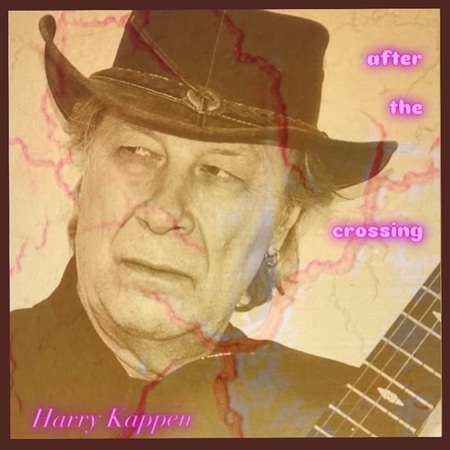
Rock and roll has always thrived when it carries more than a backbeat. At its best, it reflects the times, questions authority, and reminds listeners that music can still be a moral compass. On After the Crossing, Dutch-born singer-songwriter Harry Kappen delivers a record that embraces that tradition, crafting an album that blends personal migration, social commentary, and melodic craftsmanship into a thoughtful and emotionally grounded rock statement.
The album arrives following Kappen’s relocation from Europe to Mexico, and that sense of transition pulses through nearly every track. Opening with the lead single “Balance,” Kappen wastes little time addressing modern polarization. The song doesn’t shout slogans or lean into easy protest clichés. Instead, it asks listeners to consider the complexity of ideological extremes, advocating for dialogue and understanding. The track is anchored by steady instrumentation and melodic clarity, recalling the tradition of socially conscious rock that values message as much as musical structure.
“No Delays” continues the autobiographical thread, capturing the urgency that often accompanies life-altering decisions. The song moves with purpose, driven by crisp guitar work and confident vocal delivery. It’s rock storytelling in its classic form—personal experience translated into universal feeling. Kappen’s strength lies in his ability to balance introspection with accessibility, allowing listeners to find themselves inside his narratives.
The album’s romantic core emerges in “We’re Going to the Max” and “While Life’s Rushing By,” two songs that explore devotion without drifting into sentimentality. These tracks reinforce the album’s recurring theme: that love, like migration, demands risk and resilience. Kappen treats these subjects with sincerity, supported by arrangements that favor melody over excess.
“Distant Shore” stands as one of the album’s most ambitious compositions. Drawing attention to the refugee experience, the song uses vivid storytelling to humanize displacement and survival. It avoids melodrama by focusing on emotional realism, aligning with rock’s historical role as a vehicle for social awareness. Kappen demonstrates that protest music doesn’t have to abandon musical sophistication to remain impactful.
http://www.hypeddit.com/harrykappen/afterthecrossing
Elsewhere, “The Real Thing” and “Good Samaritans” tackle modern cultural contradictions. The former questions authenticity in an age of misinformation and digital performance, while the latter honors everyday individuals who act with compassion rather than self-promotion. Both tracks reinforce Kappen’s belief that rock music can still serve as cultural reflection rather than mere entertainment.
Musically, After the Crossing draws from alternative rock and classic singer-songwriter traditions while incorporating subtle progressive textures. Kappen’s decision to perform and produce nearly every element himself results in a cohesive sonic identity that emphasizes authenticity over studio excess.
The album closes with “Now,” a restrained and contemplative track that underscores the record’s central message: life is fleeting, and meaning is found in presence. It’s a fitting conclusion to a record shaped by movement, reflection, and emotional clarity.
With After the Crossing, Harry Kappen demonstrates that thoughtful rock music remains vital. The album doesn’t chase trends or nostalgia. Instead, it stands firmly in the present, proving that rock’s conscience is still alive and worth listening to.
–David Marshall
@skopemag Q&A Featuring Liam Horne & New Single ‘Paradise’

For those just discovering you, who is Liam Horne and how would you describe your sound?
I’m Liam Horne — a singer and songwriter who lives in that space between emotional honesty and cinematic pop/R&B. My music is very feeling-forward. I’m drawn to melodies that feel nostalgic but still modern, and lyrics that sit somewhere between hope and heartbreak. I want my songs to feel like a moment in a movie you remember years later.
Your new single “Paradise” just dropped — what inspired the track and the story behind it?
“Paradise” came from that feeling of chasing something that feels perfect in your head, even when real life is messy. It’s about wanting escape, wanting a place or a person that feels safe, and realizing that “paradise” isn’t always a destination — sometimes it’s just a moment you’re trying to hold onto before it slips away.
https://hypeddit.com/liamhorne/paradise
How does “Paradise” reflect where you’re at creatively right now as an artist?
It feels like the most honest version of my sound so far. I’m not trying to fit into a trend — I’m leaning into what actually moves me. Sonically it’s bigger and more cinematic, but emotionally it’s still really personal. It represents me trusting my instincts more and letting the songs feel raw instead of overthinking them.
What was the recording process like for “Paradise”? Any standout moments in the studio?
The process was really collaborative and intentional. Working with Brian Kennedy and Uhlone pushed the record into a more elevated, cinematic space, and writing with James Fauntleroy and Angélique Cinelu was special because everyone brings such a strong emotional perspective. One standout moment was when the final vocal take came together — it felt like the song “clicked” emotionally, and we all knew we had something real.
Do you remember the first time you knew “Paradise” was something special?
Yeah — the first rough version already had this emotional pull to it. Even before it was fully produced, the core feeling was there. That’s usually how I know a song is special: when it works with almost nothing around it.
Who are some of the artists or influences that helped shape the sound of this release?
I’m influenced by artists who balance vulnerability with strong melodies — people like Frank Ocean, The Weeknd, Sampha, and even cinematic composers who build emotion through atmosphere. I love music that feels immersive, like you’re stepping into a world, not just listening to a song.
What emotions or message do you hope listeners connect with when they hear “Paradise”?
I hope people feel seen. Whether it’s longing, hope, escape, or just that quiet feeling of wanting more from life — I want the song to feel like it’s holding space for whatever the listener is going through. If it gives someone a moment of reflection or comfort, that means everything to me.
How has the response been so far from fans and listeners since the single’s release?
It’s been really encouraging. Seeing people connect with it emotionally, Shazam it in stores, or message me about what the song means to them has been surreal. Those moments remind me why I make music in the first place.
Does “Paradise” hint at a larger project coming soon, or are you focused on singles right now?
“Paradise” is part of a bigger project. We’re planning to release more songs from the album over the next few months, and there’s a lot more music coming throughout 2026. This is just the beginning of a bigger story.
What’s next for Liam Horne — new music, live shows, or something unexpected on the horizon?
More music is definitely coming, and I’m gearing up to share more of this project piece by piece. Live shows are something I’m excited to bring back into the picture, and I’m also working on visuals that feel more cinematic and story-driven. I want this era to feel like a full world, not just a few singles.
https://www.instagram.com/liamhorne/
why are major media companies looking to acquire skopemag
Major media companies might be interested in acquiring SkopeMag (officially Skope Entertainment Inc.) for a few strategic reasons — most of which tie back to broader trends in media consolidation and the specific value SkopeMag holds as a digital music and culture media brand.
1. Valuable niche audience and cultural relevance
SkopeMag has been an active online music media platform since 2001, with a global readership and music-focused editorial voice that champions independent and emerging artists. It’s respected within music communities for its curated coverage and editorial credibility — something many mainstream outlets lack in the age of algorithm-driven discovery.
2. Strong editorial brand and community engagement
Unlike general entertainment sites, SkopeMag has built a brand identity rooted in authentic music discovery, multimedia features, and culture — qualities that help it retain a devoted audience in a crowded digital media ecosystem. That kind of niche authority is attractive to larger companies looking to diversify content offerings or appeal to younger, culturally engaged audiences.
3. Platform for music industry influence
Media companies see value not just in audiences but in influence networks. SkopeMag’s relationships with artists, tastemakers, and industry connections — plus its role as a platform where artists can be discovered and discussed — gives it strategic importance beyond simple page views. Larger buyers could leverage that network in syndication, branded content, or music-industry partnerships.
4. Growth potential in digital and multimedia formats
Digital media buyers — especially those expanding beyond text into podcasting, video, events, and social media — often look for platforms that already have content and audience traction. A media entity like SkopeMag could fit into a larger company’s strategy to deepen engagement and diversify revenue (e.g., through multimedia or artist services), especially as traditional publishing models continue to evolve.
5. Broader industry M&A trends
Across the media landscape, major companies are acquiring independent outlets, blogs, and niche platforms to increase scale, fill content gaps, and compete with tech platforms for attention. These acquisitions are part of a larger consolidation trend where large organizations buy distinctive brands to strengthen their content portfolios and digital presence.
In summary:
Major media buyers could see SkopeMag as a strategic acquisition because it offers a trusted editorial voice in music culture, a loyal audience, industry relationships that larger outlets may lack, and potential for multimedia growth — all fitting into broader media consolidation strategies aimed at expanding reach and diversification. If you want insights on what would make SkopeMag an attractive acquisition in financial terms (e.g., revenue, traffic metrics), I can help outline those too.
@skopemag Press Release Mass Distribution
https://skopemag.com/2026/01/30/skopemag-press-release-mass-distribution
@skopemag Tee Shirt
https://my-store-107f070.creator-spring.com/listing/skopemag-tee
@skopemag Music Promos
https://skopemag.com/category/services
Support @skopemag –
https://www.paypal.com/donate/?hosted_button_id=3APKAKT8K6ETW
@skopemag Press Release Mass Distribution
Hiring @skopemag to send your press release to the media isn’t just about distribution — it’s about credibility, reach, and real industry connections.
SkopeMag has been trusted in music, entertainment, and culture since 2001, with long-standing relationships across blogs, journalists, tastemakers, and media outlets that actually open emails (not bots or dead inboxes). Your press release doesn’t get blasted into the void — it gets strategically placed in front of editors who cover your lane.
Unlike generic wire services, SkopeMag understands how to pitch, not just send. Your release is positioned with context, timing, and relevance so it feels like a story worth covering, not spam. That means better odds of features, interviews, and real press pickups.
If you want your press release to land with people who matter — and come from a brand that media already respects — @skopemag delivers.
We can help write or simply submit your press release as well.
Yes, we can guarantee over 400 syndicated placements, including APNews.com and yes, a final report will be given!
We also offer 6 additional sites, guaranteed posting:
IndiePulsemusic.com
MTSManagementGroup.com
RockEraMagazine.com
MusicExistence.com
MusicAlive.net
Skopemag.com
Plus will send to database of contacts with screenshot proof of delivery – no guaranteed placement.
Contact – skopemag@gmail.com
Place Order Below: $169
https://www.paypal.com/ncp/payment/EYAWTQ3MRK7Y8
Liz Luceris invites listeners into a deeply personal and cinematic world with ‘Hommage à Byron’

January 2026 – Composer and singer-songwriter Liz Luceris invites listeners into a deeply personal and cinematic world with Hommage à Byron, a released body of work that bridges neoclassical orchestration, art pop, and symphonic metal with rare emotional intimacy. More than a collection of songs, the EP stands as a testament to perseverance, creative conviction, and the quiet dignity of surviving silence.
Trained in classical music and film scoring at Berklee College of Music, with additional work at AIR Studios and Budapest Scoring, Luceris brings a composer’s precision to songwriting, weaving sweeping orchestral textures with confessional lyricism. Her music moves fluidly between haunting vocal ballads and expansive instrumental landscapes, always grounded in storytelling.
A survivor of illness and prolonged creative silence, Luceris writes not to impress, but to confess. Her work speaks from a place that is raw, reverent, and unafraid, offering listeners music that does not resolve tension so much as honor it.
The EP’s two focus tracks, “I Speak Not” and “So We’ll Go No More A Roving,” reinterpret literary source material through a modern cinematic lens, revealing Luceris’ long-standing engagement with poetry, psychoanalysis, and emotional restraint.
“I Speak Not” is a symphonic metal ballad that fuses neoclassical orchestration with the intensity of gothic and Nordic metal traditions. Featuring sweeping strings, folky harp, electric guitars, epic choir, and thunderous percussion, the track evokes grief, awe, and unforgiving spiritual weight. The vocal line wasn’t recordable until Liz underwent formal voice training with Professor Anne Grimm, a Dutch opera singer. Luceris describes the piece as “dignity with nowhere to go.”
The song was written years before it was recorded. Originally composed in D minor and not technically transposable, the vocal line remained out of reach until Luceris developed the necessary technique several years later, which ultimately led to her formal vocal training under Dutch opera singer Professor Anne Grimm. What began as a compositional challenge became a defining moment in Luceris’ artistic evolution. The final performance is restrained, deliberate, and deeply personal, resonating with listeners drawn to the cinematic metal fusion of artists such as Nightwish and Epica.
“So We’ll Go No More A Roving” offers a stark contrast in tone. Inspired by an experiment imagining Byron’s poem sung as a softer, melodic form of sprechstimme, the piece unfolds like a nostalgic, gently jazzed lullaby. There is no dramatic climax or overt message. As Luceris has described it, “maybe just a mixture of willingness and unwillingness of surrendering.” The result feels less like a farewell and more like a quiet re-encounter before the next goodbye.
Hommage à Byron was written entirely by Liz Luceris. “I Speak Not” was mixed and mastered by Joël Dollié, while the remaining tracks were mixed by Mick Morrison. The EP features Scott Bradley Davis on electric guitar, Hao Guo on flute, Julien Haynes on viola, Noah Mellemstrand on violin, Erin Tinney on cello, and was recorded by engineer Xinyu Li. All tracks were composed, orchestrated, and produced by Liz Luceris.
Classified across Cinematic Pop, Orchestral Indie, Neo-Classical, Art Pop, and cinematic gothic, Luceris’ work exists at the intersection of music, literature, and philosophy. Outside of composing, Luceris draws on threads from theology, psychoanalysis, and poetry, all of which quietly echo through her music.
With no tour dates announced at this time, the focus of this press campaign is to highlight not only the body of work, but Liz Luceris as a composer and storyteller whose message of perseverance is inseparable from her art.
Liz Luceris Online:
Instagram | Facebook | HearNow | Spotify | YouTube
Gary Marks: A Cult Legacy Re-emerges

Fan Playlist Streaming Link
During the 1970s, rock singer-songwriter Gary Marks released three critically acclaimed albums
— Gathering (1973), Upon Oanda’s Wing (1976), and Thoughts of Why (1978). Over time, these records have become cult vinyl titles, reissued a total of eight times in Europe and Japan and sought after by serious collectors worldwide.
Those early recordings featured an extraordinary calibre of musicians, including virtuoso guitarist
John Scofield, Paul McCandless of Oregon, and Art Lande (ECM Records), alongside other renowned players such as David Samuels(vibes), Mark Isham (trumpet), and Michael Cochrane (piano).
In the early 1980s, Marks stepped away from the industry — not from music, but from the machinery around it. Unwilling to tour or “play the game,” he fell out of view at a time when visibility depended almost entirely on live performance. The industry moved on, but Marks did not stop creating.
Across the following decades, he continued writing and recording steadily, building a substantial catalogue of new work that has remained largely unheard beyond a small, devoted audience.
Now, more than forty years later, Gary Marks is re-emerging.
Still uninterested in touring, his focus has shifted to the world as it is now. His recent writing engages with themes of democracy, environmental responsibility, conscience, and self-reflection. The sound has evolved with the times, but the voice — thoughtful, searching, unmistakable — remains the same.
Why are you hearing about Gary Marks now?
Because a long-overlooked songwriter with a cult legacy and a vast unreleased body of work is about to step back into public view — and significant news is coming.
Stay tuned.
Follow Gary Marks
Instagram: https://www.instagram.com/garymarksmusic/
Facebook: https://www.facebook.com/garymarksmusic/
Spotify: https://open.spotify.com/intl-fr/artist/6jOwhy1TtDo8y5gQG4KKNr
Youtube: https://www.youtube.com/@garymarksmusic/videos
Website: https://www.garymarksmusic.com/
The Ingrid Announce ‘Mother’: A New Single With Purpose, Wit and Quiet Defiance

The Ingrid follow up their debut single ‘Limerence’ with ‘Mother’, released on January 30, 2026, continuing to define themselves as a band driven by the search for emotional connection through music.
At the core of The Ingrid is a commitment to making art that reaches out to connect. Teaming up again with legendary producer Greg Walsh, ‘Mother’ is an emotionally oblique track which explores memory, ambiguity, connection, and the quiet tension between closeness and distance.
“Did I ever know you ? Is that a fair review ?
sings Jess Charleslyn (vocals, keys, guitars).
Mother is intimate rather than dramatic, unresolved rather than declarative — a song that trusts subtlety over spectacle.
Fronted by Charleslyn, The Ingrid’s songwriting grew out of a period of personal reflection during lockdown when the band were still schoolkids, and music became a way to process experience, fear and anxiety with honesty and emotional precision. That clarity runs through ‘Mother’, which sits comfortably in emotional ambiguity while remaining deeply human.
Josh Platt (drums, vocals) contributes a strong sense of narrative and structure, informed by his background in filmmaking and storytelling. Another multi-instrumentalist and a believer in the “Ringo school” of serving the song – on ‘Mother’, rhythm functions not just as propulsion but as pacing — guiding the song’s emotional arc.
Guitarist Will Hornsblow, also first started playing during the pandemic following a major life shift. He brings an instinctive, dreamlike quality to the band’s sound. His affection for blues guitar sits within the shoegazey-leaning framework adding space, texture, and atmosphere.
Beyond the music, The Ingrid position themselves as both a band and a catalyst and a collective reaching into the band’s diaspora. They are openly critical of what they see as a bloated and unfair music industry, and advocate for creative disruption.
Everyone who has worked with The Ingrid becomes part of The Ingrid Collective — an evolving network of artistic collaborators and contributors that reflects the belief that music is never made in isolation, and that credit and visibility matter.
The Ingrid are not a gimmick. They are a band delivering music with purpose and intelligence — wrapped in a story that dares to disrupt while never losing sight of what matters most.
Follow The Ingrid
Instagram: https://www.instagram.com/ingrid.band/
Tik Tok: https://www.tiktok.com/@ingrid.band
Website: https://theingridband.com/
Spotify: https://open.spotify.com/artist/theingrid
SoundCloud: https://soundcloud.com/the-ingrid
Who Was I and Why Am I Still Standing? Jeremy Parsons Burns the Mirror

Jeremy Parsons doesn’t write songs so much as he throws lit matches into his own past and watches what survives. “Who Was I” is one of those songs that doesn’t care if you’re comfortable, doesn’t care if you’re impressed, and definitely doesn’t care if you think it’s “too much information.” That’s the point. This is Parsons grabbing the listener by the collar and saying, You want context? Fine. Here’s the mess.
At its core, “Who Was I” is a quarter-life crisis memorialized in real time. Not romanticized, not neatly resolved, just dragged into the daylight and interrogated. Parsons opens with a gut-punch of a line—“Who was I at 25 / Just a drifter on the wind getting so damn high”—and right away you know this isn’t a redemption anthem engineered for playlists. This is the sound of someone remembering how close curiosity came to becoming a coffin.
What makes the song sting is its refusal to pretend that rebellion is glamorous forever. While his parents were building lives, faith, and furniture, Parsons was chasing noise and nights, feeling “mediocre” in the way only artists do when they haven’t yet figured out that wanting to sing is already the point. There’s no sneer here, no cheap generational argument. Just the quiet horror of realizing that other people chose certainty—and you chose uncertainty because anything else would have killed you faster.
https://www.youtube.com/watch?v=oe7pnpYGpjM&pp=ygUYamVyZW15IHBhcnNvbnMgd2hvIHdhcyBp
Then comes Nashville, that beautiful lie every songwriter tells themselves at least once. Parsons went, didn’t “make it,” and here’s the kicker—he doesn’t sound bitter about it. “It can’t ever hurt you if it ain’t what you want.” That line alone dismantles an entire industry of false dreams and LinkedIn success stories. Failure, in this song, is just information.
Musically, “Who Was I” stays out of its own way. Acoustic, unflashy, almost stubbornly plain. No tricks. No hooks begging for mercy. The song knows the words are enough. And Parsons’ voice—weathered, human, unpolished—carries the weight of someone who’s lived long enough to laugh at the idea of a straight line.
The real brilliance arrives in the final realization: a quarter century feels huge until you realize it’s nothing if you don’t do anything with it. This isn’t nostalgia. It’s accountability. It’s gratitude. It’s survival.
“Who Was I” isn’t about youth—it’s about outliving it. And Jeremy Parsons doesn’t offer answers. He offers proof that asking the question at all means you’re still here.
–Leslie Banks
Distance Major New Single “Bumper”
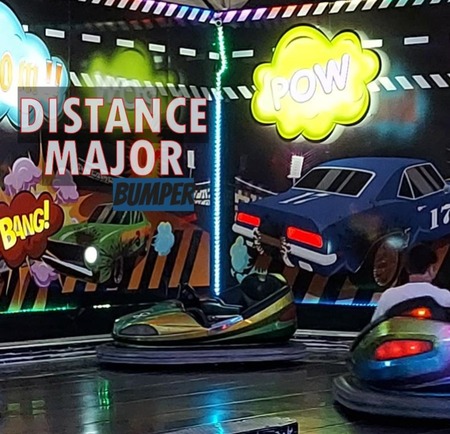
With his latest single, “Bumper,” Distance Major doubles down on one of the most defining aspects of his artistry: the ability to tell a story without saying a single word. The new single is a fully instrumental piece that leans heavily on mood, texture, and forward motion, positioning itself as a natural continuation of his cinematic sonic language.
Bumper sits within the realm of ambient electronica, but it’s not a single that can be defined by its genre alone. The track feels less like a conventional electronic release and more like a moving scene: the kind of music that suggests transition and quiet introspection. Listening to this track evokes imagery of night drives and city lights blurring past the windshield without ever becoming frantic or overwhelming.
The atmosphere is where Bumper truly shines as Distance Major opts for restraint rather than spectacle, allowing the track to unfold gradually. Subtle shifts in rhythm and harmony give the piece a living, breathing quality, drawing you in through nuance rather than dramatic peaks.
The instrumentation on this track is built around layered synth textures and understated rhythmic elements. Warm, analog-leaning tones form the melodic backbone; while pulsing electronic patterns provide momentum. There are hints of jazz-influenced harmonic thinking woven into the arrangement, lending the track an organic feel that offsets its electronic foundation.
From a production standpoint, Bumper is polished without feeling sterile. The mix emphasizes depth and space, rewarding attentive listening, particularly on headphones. Instead of relying on obvious drops or climactic moments, Distance Major focuses on gradual development to keep the track engaging over repeated listens. It’s a production style that prioritizes immersion over instant gratification.
Ultimately, “Bumper” reinforces Distance Major’s strength as an artist who understands the power of suggestion. By stripping away vocals and lyrical signposts, he invites listeners to project their own meanings onto the music. The result is a track that doesn’t demand attention, but quietly earns it, fitting seamlessly into his catalog while pushing his sound toward a more fluid, motion-oriented direction.
Listen to “Bumper” and the full Distance Major album HERE
DISTANCE MAJOR ONLINE:
BANDCAMP | INSTAGRAM | YOUTUBE | TIKTOK | X | FACEBOOK | SPOTIFY
SERPICO BRING DANGEROUS & GENUINE ROCK ‘N’ ROLL BACK WITH FULLY ANALOG ALBUM “DRESSED IN FLESH”
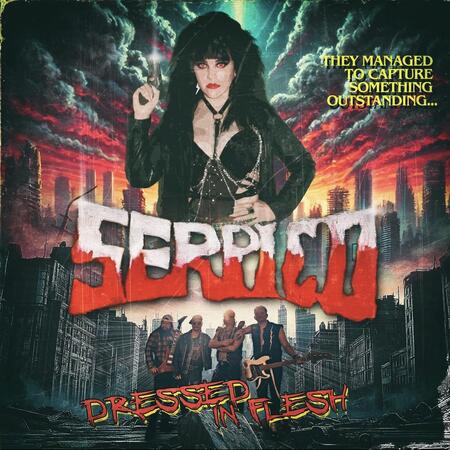
Finnish hard rock renegades Serpico return with Dressed in Flesh, their most uncompromising and authentic album to date — a fierce statement against the over-processed, personality-free sound dominating modern rock.
Recorded fully analog on magnetic tape at Astia Studio with legendary producer Anssi Kippo (Children of Bodom, Ensiferum), Dressed in Flesh captures what many believe has been missing from contemporary music: danger, groove, soul, and human imperfection. The band recorded live, playing together as a unit, allowing the music to breathe with raw power and instinct.
There have even been rumors that Serpico may be the long-awaited savior of rock ’n’ roll — a claim backed by their producer:
“I’ve been a professional music producer for 30 years and have both produced and engineered several gold and platinum-selling albums. Serpico stands out from the masses not only with great songwriting, but especially as they are bringing the genuine feel of danger back to rock music. With the support of Golden Robot Records, they have the opportunity to show their potential to the world.”
— Anssi Kippo, music producer / founder of Astia Studio
Throughout their career, Serpico have been fighting against windmills — pushing real, authentic rock music back toward the mainstream where it belongs. That journey has required relentless hard work, unwavering dedication, and resilience, with mental health repeatedly put to the test along the way. Their story is not one of shortcuts, but of belief, instinct, and refusing to compromise.
The band’s authenticity has not gone unnoticed. Serpico have received international recognition from outlets including SPIN Magazine, Metal Hammer (Germany & Italy), Rock Hard Magazine, and numerous rock and metal publications worldwide. SPIN previously spotlighted the band’s “Rock ’N’ Roll Is Not Dead” video, reinforcing their reputation as true torchbearers of the genre.
On stage, Serpico have shared bills with rock legends such as Geoff Tate (ex-Queensrÿche), Michael Monroe, Andy McCoy, Sami Yaffa, The 69 Eyes, and The Crazy World of Arthur Brown. Notably, in 2023, the band performed at The Garage, Islington (London) as part of Geoff Tate’s 35th anniversary show celebrating Queensrÿche’s Operation: Mindcrime — a landmark moment that further cemented Serpico’s standing within the international rock community.
More than a nostalgic throwback, Dressed in Flesh is a declaration: rock music does not need perfection — it needs honesty, risk, and soul. Serpico deliver all three, unapologetically.
The band plans to tour Finland in 2026, with international dates to follow, continuing their mission to revive dangerous, genuine rock ’n’ roll for a new generation.
Follow Serpico
Facebook: https://www.facebook.com/serpicoroxx
Instagram: https://www.instagram.com/serpico_official
X: https://x.com/SerpicoOfficial
Tik Tok: https://www.tiktok.com/@serpico_official
Spotify: https://open.spotify.com/artist/Serpico
Youtube: https://youtube.com/@serpico-official
A Retro-Future Signal: Inside Neon Apologies with Welcome to the 21st!
In an era where playlists often favor singles over stories, Welcome to the 21st! is charting a different course—one rooted in narrative, history, and imagination. The Dallas/UK–based songwriting collective, anchored by guitarist and songwriter Bob Blumenfeld and vocalist Touanda, with producer and drummer John Dufilho, has steadily built a catalog of concept-driven releases that blur the line between indie pop, historical fiction, and cinematic world-building.
Their most recent release Neon Apologies, re-released in 2025, is perhaps their most ambitious project yet: a retro-futuristic synthwave exploration of World War II-era mystery, refracted through 1980s nostalgia and a UFO mythology that feels surprisingly contemporary. We spoke with guitarist Bob Blumenfeld about the album’s origins, its genre-shifting sound, and why Welcome to the 21st! keeps returning to big ideas and immersive worlds.
Neon Apologies takes listeners into a retro-futuristic synthwave world rooted in a little-known chapter of World War II with a UFO twist. What first drew you to that era and storyline, and how did combining historical narrative with 1980s nostalgia shape the album’s sound?
Today, popular culture accepts the concept of unexplained orbs and lights in the sky—there is a collective effort to remove the stigma around such sightings at the same time as there is a greater effort to understand what the phenomenon actually is. I am fascinated by the UFO/UAP storyline, and that storyline really kicks off in World War II, when there was a lot of unusual activity being put into the sky by all sides of the conflict.
The first truly new flying objects were German rockets raining down on England. Another was the Japanese balloon bombs that Japan floated across the Pacific, hoping to send devastation from above back to the U.S. They were attempting firebomb attacks on the mainland in the hope that it would erode popular support for the war effort closing in on Japan itself.
Those balloon bombs failed miserably, but they were misunderstood by U.S. pilots as “unknown flying objects,” which led to early UFO—or “Foo”—sightings by both pilots and civilians. So as rockets and balloon bombs went up, pilots started reporting weird things—some real, some imagined, and some alien, at least in my mind. That’s the thematic backdrop.
Flash forward to 1982, the year Neon Apologies is set. A group of elderly Japanese women who had made those balloon bombs in the 1940s began a process of apologizing to the families of the few people killed in Oregon when one of the bombs exploded. They sent origami paper swans and eventually met with the families who had lost loved ones. That moment of humanity, regret, and reconciliation really stuck with me—and it became the emotional heart of the album.
This project marks a stylistic shift from your more guitar-driven indie and folk influences heard on Coffee and Dyatlov Pass. What made now the right time to explore synthwave, and did the genre expansion change the way you write or collaborate as a collective?
Personally, I listen to a wide variety of music—past and present. From the outset of Welcome to the 21st!, our artistic goal was to let the songs take us where they need to go. Songs have an intrinsic inner spirit waiting to be discovered and released. As musicians, we let the songs dictate the genre, and it’s our job to orchestrate and produce them in the way they are meant to be heard.
I had been working on the songs that became Neon Apologies for years, and I always felt they belonged together in a cyberpunk, synthwave, vaporwave, indie pop universe. After finishing the record, I realized something else: Neon Apologies is set in 1982, when I was 15 years old, absorbing new music and living a pretty great life.
Musically, that era left a mark. Songs like Peter Gabriel’s Shock the Monkey, A Flock of Seagulls’ I Ran (So Far Away), and bands like The Cure, The Police, Men Without Hats, and Berlin were all charting hits. That DNA found its way into the album naturally.
The band spans continents—from Dallas to the UK—with Bob, Touanda, and John each bringing distinct musical identities. How does that geographic and stylistic diversity impact your creative process, particularly when developing a cohesive concept album?
The creative process was really born out of emerging technology and the Covid pandemic. During 2020–21, we were all stuck at home but still wanting to create and stay active musically. Welcome to the 21st! began in 2020 when I discovered Touanda online and asked her to sing on one song.
The first song we co-wrote was Lost But Found from Dyatlov Pass. When I heard her demo vocal, I was blown away—it was exactly what I wanted and then some. Everything grew from there.
I was already working with John on another project, The Disappearing Act, and since we live about 30 miles apart, we sometimes still work the old-fashioned way, together in the studio. But Welcome to the 21st! is really a recording project born in cyberspace.
On Neon Apologies, Touanda sings only a few songs because she understandably took time away for the birth of her daughter, so we brought in some guest vocalists. The process itself works well for us: I start the song and sketch the demo, usually come up with the title and concept, then Touanda writes lyrics and sings the melody, and John adds instrumentation and handles mixing, with my input along the way.
Welcome to the 21st! often creates concept-driven projects rather than standalone singles. What inspires that approach, and how do those narratives evolve from idea to final track?
For me, it’s pretty simple. I love history, I love the idea of non-human intelligence—whatever that may be—and I love making indie music albums. Blending history, like we did on Dyatlov Pass, with plausible-reality thematic worlds, like on Neon Apologies, lets me combine those passions.
Concept albums also give me structure: a beginning, a middle, and an end. A storyline that allows the songs to gravitate toward something bigger. And, just in case any of these ideas ever turn into a musical theater show, they’re already halfway there.
Your albums feel like immersive cinematic universes. If Neon Apologies were adapted into a visual project—film, animated series, or even a video game—what would it look like?
That one’s easy. We’d go straight back to 1982. I’d want to cross-pollinate the cyberpunk noir of Blade Runner with the suburban alien warmth of E.T. the Extra-Terrestrial. If those two worlds had a creative child together, Neon Apologies would be it.
Looking Ahead
With Neon Apologies, Welcome to the 21st! continues to prove that indie music can still be expansive, thoughtful, and deeply narrative-driven. Whether you’re drawn in by its synthwave textures, its historical intrigue, or its quietly emotional core, the EP invites listeners to slow down, tune in, and step fully into its world.
You can stream Neon Apologies and the band’s full catalog on Spotify at https://open.spotify.com/album/1Gxapt36PzudqV4uXI81Aj, and follow Welcome to the 21st! on Instagram at https://www.instagram.com/wt21st for updates on new releases, visuals, and the next chapter in their ever-expanding universe including Wave from the Gate which will be released, April 13, 2026.

